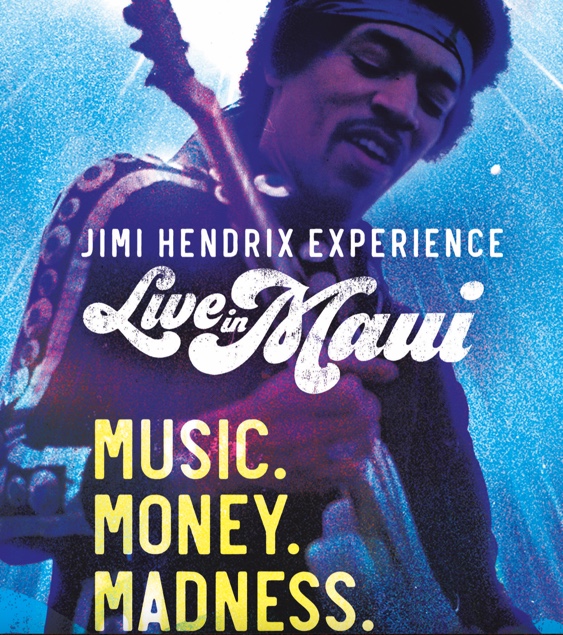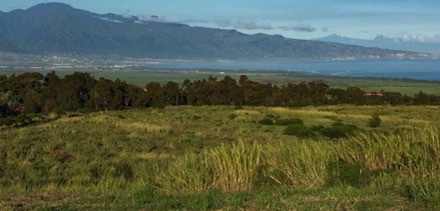Feb 16 Los Angeles Screening At The Regent Theater To Include Q&A With Director John McDermott, Producer Janie Hendrix and Recording Engineer Eddie Kramer
The first of February sees the long-awaited worldwide theatrical debut of Music, Money, Madness… Jimi Hendrix In Maui, the Grammy®-nominated documentary from Abramorama. The film will simultaneously premiere in Buffalo, Oklahoma City, Tacoma and various California cities. Screenings will also take place throughout February in cities across North America and the rest of the world, including Boston, Vancouver (BC), Albuquerque, Tulsa, Portland (OR) San Diego, Denver, Chicago, Atlanta, Philadelphia, Washington (DC), Orlando as well as in the Netherlands, Mexico, Spain and other countries soon to be announced. Nominated this year in the Best Music Film category, the film chronicles the Jimi Hendrix Experience’s storied visit to Maui in 1970, and how they became ensnared in the controversial, countercultural film Rainbow Bridge.
The Regent Theater in Los Angeles will host a special screening on Feb 16 that will include a Q&A post film conversation with filmmakers John McDermott and Janie Hendrix, as well as Jimi’s recording engineer Eddie Kramer.
“Jimi Hendrix is larger than life and his explosive concerts are meant to be experienced on the biggest screens possible. Its where Jimi belongs.

Abramorama is honored to continue our collaboration with Experience Hendrix, Sony Legacy and our cinema partners around the world to give Jimi Hendrix fans another opportunity to enjoy rock and roll history,” stated Evan Saxon head of music strategy and international distribution at Abramorama.
Directed by John McDermott and produced by Janie Hendrix, George Scott and McDermott, Music, Money, Madness… Jimi Hendrix In Maui incorporates never before released original footage and new interviews with firsthand participants and key players such as bassist Billy Cox, recording engineer Eddie Kramer, Warner Bros. executives and several Rainbow Bridge cast members, as well as its director Chuck Wein. Their fascinating account tells the definitive story about one of the most controversial independent films ever made.
By the middle of 1970, Jimi Hendrix was working on a follow up album to Electric Ladyland with his bandmates Mitch Mitchell (drums) and Billy Cox (bass), headlining festivals and arenas across the U.S. and building Electric Lady Studios in Manhattan’s Greenwich Village. Completing this state-of-the-art recording facility was proving to be a costly endeavor, so his manager Michael Jeffery procured a $500,000 advance from Warner Bros. to fund the remaining construction required to complete the studio. At those same meetings, Jeffery convinced Warner Bros. executives to finance a film called Rainbow Bridge that was to be shot in Maui, in exchange for rights to its soundtrack album consisting of new Jimi Hendrix studio recordings.
Inspired by Easy Rider and directed by Warhol acolyte Chuck Wein, Jeffery’s film centered around the idea of a “rainbow bridge” between the unenlightened and enlightened worlds. It was envisioned to feature everything from surfing and yoga to meditation and Tai-Chi and filmed without the aid of a script or professional actors. It proved to be a rambling assemblage of hippie excess and Jeffery grew concerned that his investment was being squandered. The Experience was already booked to perform a concert in Honolulu at the H.I.C. Arena on August 1, 1970. Chuck Wein, desperate to feature Hendrix in some capacity within the film, devised a plan to film a free ‘color/sound vibratory experiment’ on the lower slope of the dormant Haleakala volcano. Word of mouth about a free Jimi Hendrix concert led a few hundred curious Maui locals to the Baldwin cattle ranch in Olinda where a makeshift stage was constructed and the audience was arranged by their astrological signs. The performance was a success – the trio was at the height of its powers and played two sets flawlessly against a stunning natural backdrop.

In the aftermath of his performance on Maui, Hendrix would return to New York and his work at Electric Lady Studios. He had no further involvement in Rainbow Bridge. He left for Europe at the end of August to headline the massive Isle Of Wight festival and begin a European tour. Tragically, he would die in London on September 18, 1970.
The Cry Of Love, the first album of posthumous Jimi Hendrix recordings, was issued in 1971 to wide commercial and critical acclaim. Jeffery readied Rainbow Bridge and its accompanying soundtrack to be the next release. Despite its Hendrix association, the film was a commercial flop. Rainbow Bridge confused moviegoers, many of whom were under the impression they were going to see a concert film. A scant 17 minutes of haphazardly edited Hendrix concert footage was used in the final cut, and it proved to be the film’s saving grace. Due to technical problems inherent in the original recording of the Maui performances, Mitch Mitchell had to overdub his drum tracks at Electric Lady Studios in 1971 just so those performances could be featured. Music, Money, Madness… Jimi Hendrix In Maui incorporates much of the unused footage in its telling of this strange moment in pop culture.
The Blu-ray for Music, Money, Madness… Jimi Hendrix In Maui is also contained on a package that pairs it with The Jimi Hendrix Experience Live in Maui 2CD/3LP – the complete audio recordings of both July 30, 1970 live performances. Released in November 2020 by Experience Hendrix and Legacy Recordings, every second of existing concert footage from that day is included on the Blu-ray. According to Pitchfork, “Live in Maui has Hendrix performing the near-miracle of elevating above an earthly debacle to offer a glimpse of transcendence.”
“Director John McDermott highlights the humor that’s so common when a few hangers-on and pied pipers bite off more tabs than their brains can process. With Music, Money, Madness… he lands somewhere between Spinal Tap, Cheech & Chong, and recent surveys of the Fyre Festival fiasco.” – MOJO
“. . . an interesting snapshot of a place in time and another era long since past, flush with nostalgia” – American Songwriter
0 Replies to “GRAMMY NOMINATED DOCUMENTARY MUSIC, MONEY, MADNESS… JIMI HENDRIX IN MAUI GETS GLOBAL THEATRICAL RELEASE IN FEBRUARY”